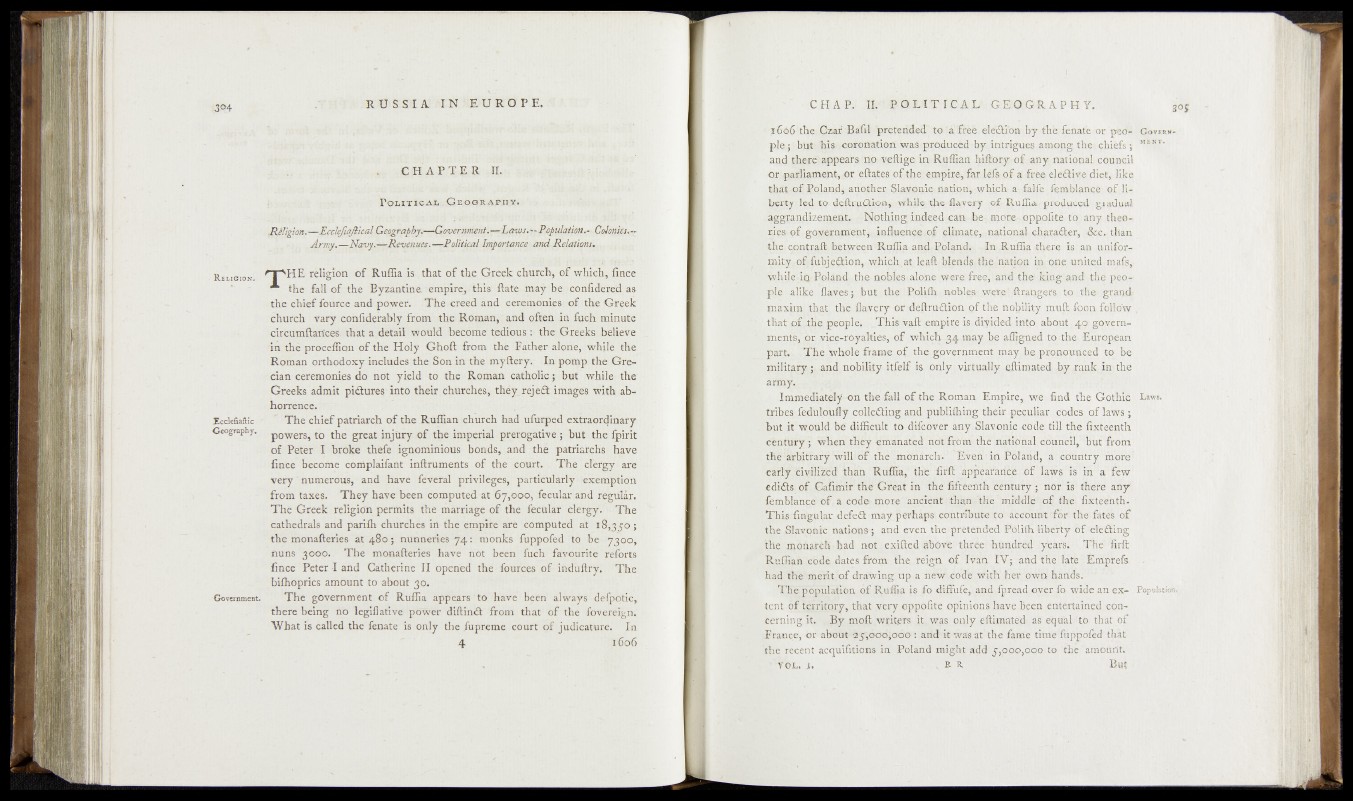
R e l ig io n .
ïc c le fia ftic
Geography.
Government.
I | C H A P T E R II.
P O L I T I O A I . .G E ^ e R A R K Y .
pRêligfm-—f^^^K^lOecgp^^i-^^opeKMUnt.f^L^s.fr-P^ulaiion.-G^^s^
Army.—Navy.— Re-venues. —rJPolitffal Importance and Relations. ,,
n pH E religion of Ruffia is that of the Greek church, of which, fince
•*“ the fall of the Byzantine, empire,.- this1 ftate may beqconfidered as
the chief fource and power. The crèed and ceremonies! of the Greek
church. Vary confiderably from the Roman,: and often in &^^in,ute
circumftariceS/ that a detail would become tedrou's-: the .Greeks believe
'in thè proceffion of the Holy Ghoft from the Father al.qn’e, while the
Roman orthodoxy includes the Son hrtfare myftery. In pomp the; «Grecian
ceremonies do not yield to the Roman catholic? but .while- the
Greeks admit pictures into their churches, they.reject images with abhorrence.
| The chief patriarch of the Ruffian church had ufurped extraordinary
powers, to the great injury of the imperial prerogative’? but .theifpirit
of Peter I broke thefe ignominious bonds, and the patriarchs have
fince become complaiiant inftruments of the'.court. . The clergy are
very' numerous, and have feveral privileges? particularly-»exemption
from taxes. They have been computedat 67,000, fecular and regular.
The Greek religion permits the marriage of the fecular dergyV -oThe
cathedrals and parifh churches in the empire are .computed at i8$jg.b ;
the monafteries at 480 j nunneries 74: monks fuppofed to be*»7^öo»
nuns '3090.. The monafteries have hot been fuch favourite,’ flforts
fince Peter I and Catherine II opened the' fources of-induflbfy: 'The
hifhoprics amount to about 30. ~
The government of Ruffia appears to have been always ddpeftic,
there being no legiflative pöwer diftinék from that of the -fovereign.
What is called the fenate is only the fupreme court of judicature. In
4 1606
1606 the Gzaf Bafil pretended to ra;fr'ee election by the fenate or peo- <**>ve*n-
p l e ; bjdfeibiAoc©ronatfeif'wasfproduced/by.4’^ trigu£s among the-chiefs j MENT-
and therefappears-’rip« veftige in Rqffiau h-iftqryio ^ a n y national council
o r parliament, or eftates o f the empire, far lefs. o f a free eledtive diet, like
th a t o f Poland, another Slavonic nation, which a- fal-fc _ femblance of libe
rty d gdVjO - d e | l J } , -? y V h j d e l C g y (<>®f Rujlias^prpdaced gradual
aggrandizement. Nothing/ indeed can be mote oppofite fo . any the©-
^ ^ © f rg^fenm'ent?^inf[-uehc.9.c^ gliinat e ,..natiopal,char-after, .t&g.^tham
t h e a n a . In Ruffiakbejre-m an unifor- ~
m ity .o f fubjeiStion, w hich,a t leaf! blends the n a tio n in .pne united mafs,
while ig Poland the nobles alone were free, and the- king and the people
alike flaves; b u t th e Polifh nobles w e re " ftrangers to tlie grand
maxim th a t the flavery or deft ruction o f the nobility muft fooii follow j
th a t o f th e people. Th is vaft empire fefti^icledjitftp; ab o u t&^(^ .g o y |rn -
^mente, .pn.v.ipe-rbyafties^^vwhith-^.^.raay be affigned'tpA-he,;,dulropean
, part.-,. ,'^The whqljtfraipe'pli, thctgp\|ernnic'nt ip a y J^ pK 'n o u g cg d to . Be
m ilita ry ;, and^noMjijfy itfelf is , o n Jyj virtually gftimated Jb y jan k in .the
army, . -
I I ns m-ediatply-o n th e f a li o f th e R o jp a ^ Rn^^e^Wj&^p'd^theX^mhm Law«.'
tribes* fednlpufly collecting a p d publiftiipg the ir peculiar;^GMdeS,qf l^ws ;
.h u t it Would be* diffisuk to- dtfcffeer any.SlavOj^is.code till the ftxteqnth,, ^
c e n tu ry ; when the'y «emanated ndftfrom the national coUtfcil, nlut from
th e arbitrary5 w ilP o f th e f'monarch. J ^ y k n * in Polan^, ^ad'£Md,try/mote'
e a riy -Mi^^pd; |h i b Ruffia, |l?e 16% a p p e ^ 4 eEj’p f 'law s^^^iA 'fe -few
edidts o f ^arinrir the Great m ’VhdKfteenfn pentury • n o rfis5 there any*
Temblance'-of a code-more ancient/ th an ,-1$re middlfet|o£ sheGfi^tesfetjh- 1
TbiScfti!%n\ar defeat-may',p&bap^GOfi.tiCb!lte< foSictsOtffft 'fo r th e fates o f
the Slavonic nations ; and even the pretended Polifti -liberty o f elefting
the, m o n a rch -h ad not exifted above three hundred years. T h e firft:
Ruffian code dates from the reign, o f Ivan IV; and the late Etnprefs -
had th e -m e rit o f drawing up a new code with; her own hands.- |
T h e po p u litip n o f Ruffia is fo diflufe, and fpread over fo wide an ex- Population,
ten t o f te rritory j that very oppofite opinions have been entertained concerning
it. B y moft writgfSj i t , was only eftimated as equal to that of
Trance? of about 25,000,000 : and it was at the fame time fuppofed th a t
the recent acquisitions in Poland might add 5,000,000 to 'the amount.
"'VriL.'i.. , ; . ' ■ But-«